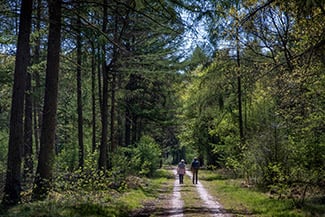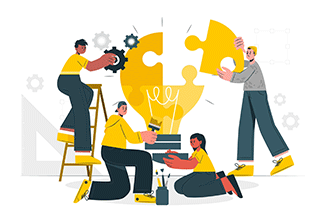Scientific News
How does laughter affect cognition?
 Laughter has an important role in our lives. It often helps to improve mood and can even help relationships last longer. But how does laughter affect cognition specifically? Let’s take a look at the research!
Laughter has an important role in our lives. It often helps to improve mood and can even help relationships last longer. But how does laughter affect cognition specifically? Let’s take a look at the research!How laughter affects the brain
Psychology professor and author Shelia M Kennison notes that research has shown humor to be intertwined with our cognitive health. It can positively impact memory, brain development, overall mental health, and more.
When we laugh or even just observe someone else laughing, many parts of our brains are active. Laughter activates the frontal lobe, which helps us understand the context and nuances of humor, and the ...
Cognitive tips for building new habits
 Building habits can help anyone to improve aspects of their life. Many strive to maintain healthy habits such as eating a balanced diet, sleeping on a regular schedule, and caring for cognitive health. Habits can be beneficial for anyone living with a cognitive condition.
Building habits can help anyone to improve aspects of their life. Many strive to maintain healthy habits such as eating a balanced diet, sleeping on a regular schedule, and caring for cognitive health. Habits can be beneficial for anyone living with a cognitive condition.Why habits matter
In many ways, habits form our lives. What we do every day makes up our months and years. Building habits around a healthy lifestyle and caring for cognitive health can make life easier and therefore more enjoyable.
Another way to look at it: not having healthy habits can create new obstacles in your life. For example, if you don’t have a healthy sleeping habit in ...
Are forests a natural treatment for stress?
 Living in the city appears to be more stressful than living in nature. This is a commonly accepted observation and a growing number of (mostly empirical) studies are highlighting the potential physical and psychological benefits of green spaces. In the present study, conducted in Germany, the scientists aimed to demonstrate whether a walk in the forest was actually better at relieving stress than a walk in the city.
Living in the city appears to be more stressful than living in nature. This is a commonly accepted observation and a growing number of (mostly empirical) studies are highlighting the potential physical and psychological benefits of green spaces. In the present study, conducted in Germany, the scientists aimed to demonstrate whether a walk in the forest was actually better at relieving stress than a walk in the city.More than half of the world’s population currently resides in cities. Numerous studies have established that leading an urban lifestyle has a significant impact on anxiety and mood disorders. On the other hand, living in a rural area, or regularly spending time in ...
Let’s take a walk in the woods...
 Many studies have focused on the potential physical and psychological benefits of green spaces, but only a few studies have investigated their role in cognitive development. We have already highlighted some studies on the potential effects of green spaces, in particular on improving attention in young children or on the importance of spending time in nature for our physical and mental health. Recently, researchers from University College London and Imperial College ...
Many studies have focused on the potential physical and psychological benefits of green spaces, but only a few studies have investigated their role in cognitive development. We have already highlighted some studies on the potential effects of green spaces, in particular on improving attention in young children or on the importance of spending time in nature for our physical and mental health. Recently, researchers from University College London and Imperial College ... Can empathy improve creativity?
 In the workplace, “soft skills” are becoming increasingly important and encouraged, and social and emotional skills can be counted among them. This awareness is nothing new; as the authors this study remind us, John Dewey, an American philosopher and psychologist of the first part of the 20th century, understood the importance of teaching these skills from very early on. “There is no education when ideas and knowledge are not translated into emotion, interest and volition.” Nearly a century later, the research team at Cambridge (England) questioned whether teaching empathy could be beneficial for learning, and more specifically for creativity.
In the workplace, “soft skills” are becoming increasingly important and encouraged, and social and emotional skills can be counted among them. This awareness is nothing new; as the authors this study remind us, John Dewey, an American philosopher and psychologist of the first part of the 20th century, understood the importance of teaching these skills from very early on. “There is no education when ideas and knowledge are not translated into emotion, interest and volition.” Nearly a century later, the research team at Cambridge (England) questioned whether teaching empathy could be beneficial for learning, and more specifically for creativity. For the past two ...
The third thumb: how do our brains adapt to "augmented body" technology?
 While many scientists are trying to develop technologies to "mend the living," others are trying to use technology to improve the comfort of those in good health, or even improve the capacities of the human body (such as human exoskeletons, for example). Several years ago, Dani Clode, a London designer developed the Third Thumb, an additional robotic finger. Apart from any debate on the merits of such an invention, the present research has the interest of asking the following question: how does the human brain adapt to this third thumb, to this augmented body?
While many scientists are trying to develop technologies to "mend the living," others are trying to use technology to improve the comfort of those in good health, or even improve the capacities of the human body (such as human exoskeletons, for example). Several years ago, Dani Clode, a London designer developed the Third Thumb, an additional robotic finger. Apart from any debate on the merits of such an invention, the present research has the interest of asking the following question: how does the human brain adapt to this third thumb, to this augmented body?It’s an important question indeed: if body augmentation devices can advance in great strides, it is important, even ...
Shall we sing?
 While physical activity, healthy eating and cognitive stimulation have been the object of much research when it comes to healthy aging. However, research on the potential positive effects of musical activities has been largely limited to the practice of a musical instrument. The current study, published in the journal Plos One is thus rather unique as it investigates the benefits of choir singing on cognitive health.
While physical activity, healthy eating and cognitive stimulation have been the object of much research when it comes to healthy aging. However, research on the potential positive effects of musical activities has been largely limited to the practice of a musical instrument. The current study, published in the journal Plos One is thus rather unique as it investigates the benefits of choir singing on cognitive health. Various research has already suggested that music can be a source of pleasure, learning and well-being. As the authors point out in their study’s introduction, musical training can also have positive repercussions on cognition through transfer effects on executive ...
Do we choose our friends more wisely as we age?
 The findings are clear: as we get older, we tend to be more and more selective in friendship, choosing our circles of trusted friends and positive relationships. According to a study carried out by primatologists and psychologists at Harvard University, chimpanzees also show this same behavior. Could studying our "ancestors” help us to be better understand this social selectivity, which can potentially contribute to healthy aging?
The findings are clear: as we get older, we tend to be more and more selective in friendship, choosing our circles of trusted friends and positive relationships. According to a study carried out by primatologists and psychologists at Harvard University, chimpanzees also show this same behavior. Could studying our "ancestors” help us to be better understand this social selectivity, which can potentially contribute to healthy aging?Research has already shed light on the importance of social bonds throughout our lifetime; and, in particular, how they can help improve cognitive health. In humans, aging is characterized by an increased focus on pre-established positive and close ...
What's the best gift for kids? The latest video game or a family outing?
 Because of the pandemic this year, Christmas was a little different from usual, but one thing didn't change. Kids of all ages received gifts: teddy bears and Legos for the little ones and the latest video game for the older ones. Have you ever wondered whether kids might actually prefer intangible gifts, like sharing time with family and friends?
Because of the pandemic this year, Christmas was a little different from usual, but one thing didn't change. Kids of all ages received gifts: teddy bears and Legos for the little ones and the latest video game for the older ones. Have you ever wondered whether kids might actually prefer intangible gifts, like sharing time with family and friends?Lan Nguyen Chaplin, an associate professor of marketing at the University of Illinois, Chicago and her colleagues at HEC Paris, and the Universities of Michigan and Minnesota set out to determine whether children and adolescents (ages 3 to 17) felt greater joy when receiving material gifts or by sharing an experience. Over the course of ...
How do our choices influence our preferences?
 “If I picked it, I must like it, right?" What shapes our preferences? An American research team attempted to answer this question by studying how infants make choices. This study, published in Psychological science, shows that sometimes we may justify our decisions after the fact to avoid what is known as "cognitive dissonance."
“If I picked it, I must like it, right?" What shapes our preferences? An American research team attempted to answer this question by studying how infants make choices. This study, published in Psychological science, shows that sometimes we may justify our decisions after the fact to avoid what is known as "cognitive dissonance." We make choices on a daily basis (even if it is just deciding what to eat). Sometimes, we choose things we like, but other times, we like things because we have chosen them. According to L. Feigenson, who co-authored the article, this inverse reasoning could explain these unconscious inferences that we all make: the first: "I chose this so I must ...







